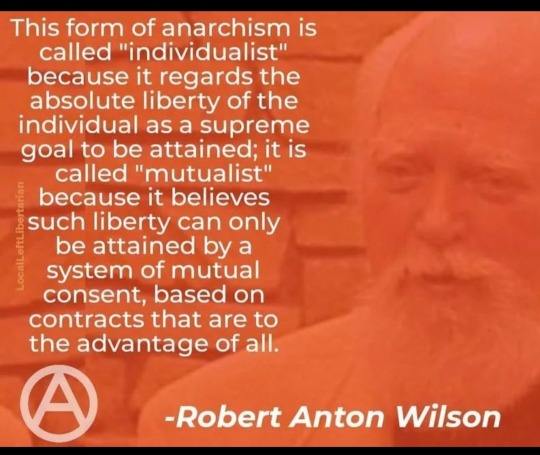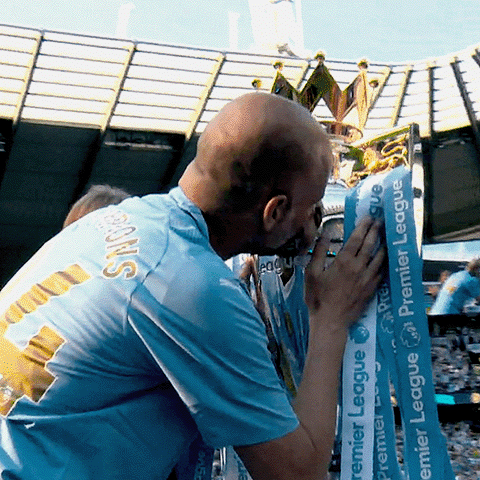#kevin carson
Explore tagged Tumblr posts
Text

Ancap visions of a "stateless society" entail taking numerous elements of the present system which are actually the result of centuries of collusion between the state and the economic ruling class, treating them ahistorically as "natural" and "voluntarily," and then constructing an imaginary "stateless" order with the nominal machinery of the state removed but all those other elements left in place as the basis of their "free market" order.
– Kevin Carson
134 notes
·
View notes
Text

"War is the easiest way to shift vast, unaccountable new powers to the State. People are most uncritically obedient at the very time they need to be most vigilant."
— Kevin Carson
#Kevin Carson#leftism#leftist#left is best#leftistquotes#book quotes#quotes#quoteoftheday#life quote#book quote#beautiful quote#quote#quotable#ausgov#politas#auspol#tasgov#taspol#australia#fuck neoliberals#neoliberal capitalism#anthony albanese#albanese government#anti war#fuck war#class war#anti capitalism#antifascist#antiauthoritarian#antinazi
7 notes
·
View notes
Text


Author: Kevin Carson Topics: health care, left-libertarianism
Mutualist, at the livejournal blog of the same name, writes on “Building Consensus with Egalitarian Liberals in Healthcare Reform.”
His argument is that libertarians and egalitarian liberals are likely to disagree on demand-side issues like single-payer insurance vs. medical savings accounts, because they’re so closely tied up with differences in purchasing power. But liberals are more likely to be sympathetic to proposals to open up the supply of healthcare to competition. Breaking the power of the license cartels and the patent system, and eliminating barriers to a fully functioning market (i.e., permitting price competition through advertising) would drastically reduce the price of healthcare and greatly empower the consumer.
And, I’d add, if we did that, discussion of demand-side reforms might be a lot more politically feasible.
Liberal welfare-statism is a pretty natural--if misguided--reaction to a society in which the state, through privilege, creates great disparities in income. Privilege creates massive distortions, made cumulative through the process of feedback, that must be dealt with somehow. One way of dealing with the consequences is through a Rube Goldberg device like redistributive welfare policy, another layer of policy to counteract the first layer, to prevent underconsumption from becoming too destabilizing and the underclass from becoming too radicalized. The other way is to eliminate the privilege itself--a lot simpler.
But make no mistake. If the privilege remains, statist “corrective” action will be the inevitable result. That’s why I don’t get too bent out of shape about the statism of the minimum wage or overtime laws--in my list of statist evils, the guys who are breaking legs rank considerably higher than the ones handing out government crutches. All too many libertarians could care less about the statism that causes the problems of income disparity, but go ballistic over the statism intended to alleviate it. It’s another example of the general rule that statism that helps the rich is kinda sorta bad, maybe, I guess, but statism that helps the poor is flaming red ruin on wheels.
Libertarians need to stop admiring the emperor’s clothes and pretending that disparities in income reflect the triumph of industrious ants over lazy grasshoppers. Liberals might be a lot easier to talk to then. That Galt’s Gulch bullshit can be kind of hard to listen to sometimes.
I’ve argued elsewhere myself, by the way, that we need to go beyond cooperative solutions to healthcare finance, and get into cooperatively organizing delivery of service, as well.
#libertarian#leftism#healthcare#health care#libertarianism#politics#medicine#science#kevin carson#anarchism#anarchy#anarchist society#practical anarchy#practical anarchism#resistance#autonomy#revolution#communism#anti capitalist#anti capitalism#late stage capitalism#daily posts#libraries#social issues#anarchy works#anarchist library#survival#freedom
5 notes
·
View notes
Text

#anarchism#mutualism#robert anton wilson#benjamin tucker#pierre joseph proudhon#socialism#libertarian socialism#left wing market anarchism#freed market anti capitalism#anti capitalism#kevin carson#c4ss#free market as full communism#market socialism
39 notes
·
View notes
Text
Book
Rise and Persistence of the Village Commune Communal Property: A Libertarian Analysis Kevin Carson, 2011
0 notes
Text
When is Capitalism Not Capitalism? - Kevin Carson, January 14th, 2016
-
As used by right-wing apologists for “free market capitalism” (an oxymoron if ever there was one), capitalism is the source of everything good in the world — but also something that never existed. And it switches repeatedly back and forth from one to the other, every couple of sentences, in the same argument. I learned this from interacting with the right-libertarians who’ve been using the “anticapitalists with iPhones LOL” meme to troll the #ResistCapitalism hashtag on social media.
I cited Arthur Chu’s observation that “Capitalism didn’t make your iPhone. Workers did. Capitalism just determines how the rents are distributed.” In response, someone said “Capitalism created the freedom that allowed people to invent the iPhone.” I pointed out to them all the ways that Apple’s profits from the iPhone depend on the use of the state to restrict freedom, both directly by using “intellectual property” to impede free cooperation and replication of technology outside their corporate framework, and indirectly through state subsidies to the offshoring of production to countries where workers are easier to exploit. The would-be defender of capitalism immediately piped up “What do subsidies have to do with capitalism? That sounds more like government to me.”
Aha. So the iPhone demonstrates the wonders and productivity of “free market capitalism,” but all the state-enforced monopolies, subsidies and other government intervention that Apple’s actual profit model depends on are “government.” Gotcha.
Sorry, but you can’t have it both ways. You can use “capitalism” as the name either for an idealized free market system that has never existed in practice, or for the actually existing historical system that you’re an apologist for. You can’t do both. If you start with the corporate capitalism that Apple is part of, and then take away the historical legacy (and ongoing process!) of peasant land enclosure, colonialism and neo-colonialism, slavery, land and resource grabs, “intellectual property” and other monopolies, and restrictions on the free movement and association of labor… well, you don’t have much left.
If you want to argue that “real capitalism has never existed,” and repeat “That’s not capitalism, that’s corporatism!” like a broken record, fine. But you can’t turn around then and use the products of a transnational corporation like Apple as an example of capitalism. If you do, you’re either stupid or a liar. It’s that simple.
And when you get right down to it, “capitalism” is a really bad term for a free market system. The word originated in the early 19th century as a name for the real-world historical system of capitalism, that emerged from the late Medieval economy from about 1500 or so on. And the state was absolutely integral to the emergence of that system of political economy, and to the form it took. It was a system in which the state actively intervened in the market, in all the ways (and more) I listed two paragraphs above, and did so on behalf of capitalists.
The use of “capitalism” by self-styled “free market” advocates only came later. It was a word that already had a long history — a history, in Marx’s words, written in letters of blood and fire — and was clearly identified with specific class interests. So when Mises and Rand chose that word, a word with those bloody associations and class identifications as their name for the “free market” — and named their ideal system after capital, one particular factor of production, at that! — you damn well better believe they had an agenda, and knew exactly what they were doing.
Corporate capitalism is not the free market, no more than was Soviet state communism. Both capitalism and state communism are coercive systems of power that parasitize on the creativity and cooperative labor of freely interacting human beings, so that those in power — whether CEOs and coupon-clippers or commissars — can live off the products of ordinary people’s efforts and ingenuity.
[source]
#free market#free market capitalism#capitalism#corporate capitalism#corporatism#labor#labour#arthur chu#kevin carson#c4ss#anticapitalism#subsidies#government#libertarianism#intellectual property#antistate#philosophy
1 note
·
View note
Text















The most charismatic characters of Final Destination.
#final destination#alex browning#devon sawa#william bludworth#tony todd#clear rivers#ali larter#billy hitchcock#seann william scott#carter horton#kerr smith#final destination 2#thomas burke#michael landes#kat jennings#keegan connor tracy#rory peters#jonathan cherry#eugene dix#t. c. carson#t c carson#final destination 3#wendy christensen#mary elizabeth winstead#ashley freund#chelan simmons#ashlyn halperin#crystal lowe#ian mckinley#kevin fischer
385 notes
·
View notes
Text
Of course, besides goalie hugs/bonks, another fave: LOCKER ROOM CELLY
IS THAT QUINN?! IT IS!! 🥹🥹 I can't believe we're getting a Quinn crumb (i love it)
(Colorado Avalanche @ Vancouver Canucks, Feb 4, 2025)
#i posted the ig story first but then i SAW quinn in the twitter version#so i edited it#vancouver canucks#canucks#nhl#hockey#quinn hughes#derek forbort#carson soucy#pius suter#marcus pettersson#linus karlsson#brock boeser#kiefer sherwood#elias pettersson#tyler myers#nils höglander#dakota joshua#drew o'connor#filip chytil#kevin lankinen#conor garland#teddy blueger#where is demmy give me demmy#ruinix net
258 notes
·
View notes
Text

assorted chibi canucks
#can u name them all!!!!!#vancouver canucks#answer key in order of tags i suppose#dakota joshua#elias pettersson#brock boeser#quinn hughes#carson soucy#kevin lankinen#kiefer sherwood#teddy blueger#thatcher demko#my art
112 notes
·
View notes
Text
Redraw i think I didn't post here

#inazuma eleven#inazuma 11#ie#my art#fan art#digital art#redraw#inazuma eleven manga#endou mamoru#mark evans#kazemaru ichirouta#nathan swift#kabeyama heigorou#matsuno kuusuke#maxwell carson#handa shinichi#steve grim#ina11#paul peabody#tamano gorou#kageno jin#jim wraith#kurimatsu teppei#ayumu shourinji#someoka ryuugo#kevin dragonfly#gouenji shuuya#axel blaze
65 notes
·
View notes
Text
Breaking the Chains of Nationalism
"Nandita Sharma and Mahmood Mamdani, the two scholars whose interpretations most heavily influenced the previous sections of this paper, agree in large part on the necessary approach to the problems outlined there. The evil to be abolished, as Sharma describes it, is “autochthonous discourse,” characterized by “essentialist and ahistorical ideas of nation and race, both of which are then made the fundamental basis of legitimate political claims,” a corresponding claim that “National-Natives are the original and ultimate source of law and the grantors of rights,” and a demand to “transform land into nationally sovereign territory.”90 To reject these things is “to reject the postcolonial system of nation-states and build social relationships, social bodies, and practices of social reproduction able to meet liberatory demands.”91
This is not to say, of course, that Sharma in any way opposes demands for justice for Indigenous people; she unambiguously opposes the “long and infamous list of scholars trying to deny and to depoliticize the violence enacted upon those categorized as Natives and to reject their demands for liberty.” She challenges, rather, “the strategy of laying claim to national sovereignty….”92
…I join the many others who have taken “lines of flight” away from essentialist, ahistorical, and reified views of social relations and recognized that difference making is always political. Along with the mythical builders of the tower of Babel creating their own heaven on earth, I follow the many, many people who have forged solidarity across – and against – gods, empires, and nations and who have worked for a worldly place that is a home for all…. Claiming this “we-ness” is also a political decision, of course, one that, unlike nationalist autochthonies, is borne out of a shared political project, not a shared genealogy or a shared territory. This book urges us to join the many people over time and place struggling to liberate our land and our labor from expropriators and exploiters. Now, as then, a heaven on earth will only be of our making.93
The call to replace the nation-state, Sharma observes, seems to imply a “postnational state – that is, a state that merely administers its territory without setting any boundaries of state belonging, a state that merely acts as a system of redistribution and protection without demanding adherence to one or another form of identity.” But states, as such, can be problematic; the very concept of the territorial state carries historical connotations of domination.
Yet, states are much more than administrative institutions. Historically, states emerge when a ruling class is formed. In the process, land is turned into state territory upon which people’s labor is exploited. This is an aspect of each and every form of state power: monastic, monarchical, imperial, or national. It is through these sorts of relationships, ones that govern people’s sense of both time and place, that certain forms of state-mandated identities, such as “race” and nation, arise. Such identities are indeed state effects. This is to say that a world without borders, without racisms, without people being separated into categories of Natives or Migrants, is not a matter of making a slight administrative fix. It would turn the Postcolonial New World Order upside down.94
Here she appears to be calling for something more like an end to the state itself, at least of the Westphalian type that has existed for the past four hundred years. As possible models for what might take its place, she suggests the historical precedents of the builders of the Tower of Babel, who “set out to defy God’s claim to be their Lord by collectively erecting a tower to the glory of their self-produced heaven on earth,” and the Diggers, who “demanded not only a return of the commons stolen from them, but its expansion to encompass the whole of the world being taken by capitalists and colonists”; and the Ranters, who “refused distinctions of place” and called for the people of the nations to become “one people and one body.”95 This evokes something that transcends the state – something both larger than the traditional state, in that it has no boundaries, and at the same time less statelike and more administrative in the exercise of its powers.
In regard to demands for justice to the dispossessed and expropriated, Sharma distinguishes between claims to land based on possession – including customary common or other communal rights based on actual physical possession by communities – and theoretical collective title to a territory based on ethnicity. What should be restored, through landback or land reform policies, is the right of people, as people and not a People, to maintain occupancy of land – either individually or communally, including seasonal hunting grounds – of which they are and have been in physical occupancy. What is to be restored is possession, both physical and functional, by concrete communities, and not by imagined and constructed communities on the basis of ethnic identity.
Unlike demands for a return of land (and water and air) in order to liberate people from exploitative relationships such as demands for the return of the commons…, demands for territory are political claims that define the extent of the sovereign’s domain over land (and water and air) as well as the labor of the people living on it.96
Mamdani’s vision is slightly less ambitious. Rather than a new Tower of Babel or Digger commonwealth, he proposes something like the denationalized state Sharma mentioned in passing.
I don’t pretend to know exactly what this next world will look like. Decolonizing the political is nothing less than reimagining the order of the nation-state. I cannot prescribe the outcome. I do have some recommendations for getting there, though. First, to reform the national basis of the state by granting only one kind of citizenship and doing so on the basis of residence rather than identity. Second, to denationalize states through the institution of federal structures in which local autonomy allows diversity to flourish.97
As his call for local autonomy suggests, Mamdani makes it clear that abolishing the national state, as a territorial sovereignty grounded in ethnic identity, does not as such rule out some form of corporate existence for ethnic groupings within the territory of a state. For example, he proposes the continued existence of self-governing Native American communities in the United States, along with the restoration of land to them as corporate entities.
What would decolonization mean from the point of view of Indians in the United States? In the words of Roxanne Dunbar-Ortiz, “That process rightfully starts by honoring the treaties the US made with Indigenous nations, by restoring all sacred sites, starting with the Black Hills [of South Dakota] and including most federally held parks and land and all stolen sacred items and body parts, and by payment of sufficient reparations for the reconstruction and expansion of Native nations.” Decolonization should also feature “extensive educational programs” and extend beyond Indians, requiring “the full support and active participation of the descendants of settlers, enslaved Africans, and colonized Mexicans, as well as immigrant populations.”
The further question, as I see it, is what exactly the participation of the settlers should look like. Dunbar-Ortiz rightly points to the payment of reparations; I would add further conditions. One is the establishment of constitutionally defined federal autonomy. This could mean statehood, building on the demand of the Five Civilized Tribes “for admission as a state of the Union.” Such a change would be impossible without the cooperation of the wider American people and their representatives in Congress. Another possibility is to end the status of wardship by granting reservations themselves representation in both houses of Congress, abolishing the BIA, and democratizing tribal governance.98
In the United States, he continues, decolonizing the political in practical terms “would involve full and equal individual rights for all citizens, whether they live within or outside Indian reservations.”
It would involve the abolition of reservations and their replacement with a constitutionally defined form of autonomy, akin to that of individual states of the Union. This autonomy would mean an end to Congressional rule by decree, and its corollary, the exclusion of autonomous Indian communities from representation in both houses of Congress. These communities would be empowered to make local laws in place of the federally sanctioned, Bureau of Indian Affairs-supervised regime of customary laws. Finally, decolonization of the political would incorporate reparations for the wrongs done over centuries, a measure of social justice for Indians and for descendants of enslaved Africans as well as for Mexicans and Puerto Ricans forcibly incorporated into the United States….99
Nevertheless, the existence of a high degree of decentralization, on the “community of communities” model which Mamdani seems to suggest, does not extend to national sovereignty of the Westphalian type. The larger territorial state is denationalized entity whose people transcend their former identities as natives and settlers, as “survivors.” “The only emancipation possible for settler and native is for both to cease to exist as political identities.”100
As an anarchist, I find the proper approach to abolishing the national state much closer to Sharma’s Tower of Babel than to Mamdani’s denationalized state with local autonomy and landback. If he seeks to free the state from the nation, we must take one step further and free governance and administration from the state. This issue will be addressed in the third and last part of this paper."
-Kevin Carson, "Landback - Abolishing Ethnonationalism and the Ethnostate: With Particular Regard to the Israel-Palestine Conflict"
14 notes
·
View notes
Text
”Actually inventing or producing things is at best the path to small-time wealth. The really big fortunes — the billionaire kind — instead come from controlling the circumstances under which other people are allowed to produce things."
— Kevin Carson
#Kevin Carson#david graeber#videos#video#leftism#leftist politics#leftistquotes#book quotes#life quotes#quotes#quoteoftheday#book quote#life quote#beautiful quote#quote#quotable#ausgov#politas#auspol#tasgov#taspol#australia#fuck neoliberals#neoliberal capitalism#anthony albanese#albanese government#anti capitalism#antifascist#anti colonialism#anti imperialism
7 notes
·
View notes
Text


Author: Kevin Carson Topic: health care
Alternet has an interview with Dr. Richard Deyo, who co-authored Hope or Hype: The Obsession with Medical Advances and the High Cost of False Promises. Some excellent bits of analysis, although (like a typical goo-goo) he gets the big picture wrong.
The problem with me-too drugs is a big one. Me-too drugs are chemically very similar to other drugs already available, yet they are typically marketed as if they were important new breakthroughs, and typically with very high prices. We found in many cases that new, expensive me-too drugs are not necessarily better than older generic and less expensive drugs. Because new and heavily marketed drugs seem like they must be better, manufacturers can command higher prices. That is an important driver of drug costs.
The central factor in this process is the state’s patent policies, which drastically inflate the profitability of the newer “me, too” drugs against much cheaper competitors that do very nearly the same thing. Indeed, the patent process has a huge distorting effect on R&D, since it results in so many resources being channelled into tweaking existing drugs just enough so that they can be re-patented as “new.” Then the drug reps hit every hospital and clinic in America, drop off some free samples and pamphlets, and (most M.D.s relying on drug industry handouts for their information on the new drugs that have come out since they left med school) the “me, too” drug becomes the new standard form of treatment.
The state having created the “honey pot” with its patent system, it is quite predictable that the state-enforced drug cartels and the white-coat Mafia (medical licensing boards with their mainly pharma-influenced “standards of practice”) should drive the industry toward a model focused on these high-cost drugs, and crowd out low-cost alternatives.
Any doc who (say) recommends Co-Enzyme Q-10 as a first recourse against congestive heart failure, or attempts some other low-cost departure from the drug-‘em-and-cut-‘em model, had better remember the state licensing board has its eye on him. Even stipulating that patents themselves are legitimate (which they are not), this latter practice has the effect of outlawing one of the most important defenses against monopoly: what Schumpeter called “product-substitution.”
The fact that the authors’ proposed response to this state capitalist sewer is even more state intervention (finessing the FDA approval process, more regulation of advertising, more procedural oversight of research), rather than eliminating the forms of state intervention that create the honey-pot in the first place, is mind-boggling. It’s like looking at one of those Rube Goldberg inventions.
Speaking of inventions.... One of the best regular features on MST3K was the weekly “Inventions” segment. My favorite was a treadmill with motorized wheels on the bottom, just in case you felt like moving around outside while you were walking. But with big government liberals making proposals like these, it’s hard for the farceurs on the Satellite of Love to compete.
#us healthcare#us politics#healthcare#health care#medicine#science#fda#kevin carson#anarchism#anarchy#anarchist society#practical anarchy#practical anarchism#resistance#autonomy#revolution#communism#anti capitalist#anti capitalism#late stage capitalism#daily posts#libraries#leftism#social issues#anarchy works#anarchist library#survival#freedom
2 notes
·
View notes
Text























👑𝐂𝐡𝐚𝐦𝐩𝐢𝐨𝐧𝐬 𝐨𝐟 𝐄𝐧𝐠𝐥𝐚𝐧𝐝👑
#Manchester City#Man City#MCFC#Scott Carson#Stefan Ortega#Ederson#John Stones#Nathan Ake#Sergio Gomez#Manuel Akanji#Rico Lewis#Mateo Kovacic#Jack Grealish#Jeremy Doku#Matheus Nunes#Phil Foden#Oscar Bobb#Erling Haaland#Julian Alvarez#Pep Guardiola#Bernardo Silva#Rodri#Ruben Dias#Kevin De Bruyne#Kyle Walker#23/24#PL#💙
178 notes
·
View notes
Text


@jonithescarlet Told me to redraw this screenshot, so I did!
#kazemaru ichirouta#nathan swift#someoka ryuugo#kevin dragonfly#matsuno kuusuke#maxwell carson#inazuma eleven#ina11#drawing#fanart#artists on tumblr#my art
133 notes
·
View notes
Text













CLOWN IN A CORNFIELD (2025)
Director: Eli Craig Cinematography: Brian Pearson
#clown in a cornfield#eli craig#adam cesare#katie douglas#aaron abrams#carson maccormac#kevin durand#will sasso#vincent muller#cassandra potenza#verity marks#2025#2025 horror#frendo#frendo the clown#slasher#slashers#slasher movies#kettle springs#horror#horror movies#cinematography#movie screencaps#movie screenshots#movie frames#film screencaps#film screenshots#film frames#screencaps#screenshots
18 notes
·
View notes